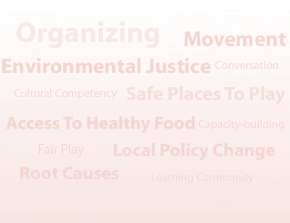- Login to post comments
Why Policy Matters
Policies determine our quality of life. They are the agreements, the codes that shape every aspect of our lives. Policies at the local level play a particularly important role because it is there that health advocates are better able to mobilize and win effective and innovative laws to support healthy food access and access to recreation resources. One recent example of how policy can be used to create a healthier environment is in Los Angeles, where the City Council unanimously approved an ordinance placing a moratorium on new fast food restaurants in South Los Angeles where outlets were over concentrated. Residents are fighting to get support for more food markets and other healthy food outlets. Search the databases below for more examples of progressive policy work on the local level: Progressive Policies Database Collection ENACT Local Policies Tool
Why Local?
Changing norms and environments are in the main a local project. Lasting environmental change is accomplished by a range of local players working together, and where local leadership is supporter with strong policy skills and community organizing experience, whether or not they are public health “content” experts. Local policy work deserves more attention, not only for its local impact but because it is now the primary form in which social policy is developed. Policy development, previously the domain of experts and lobbyists, is increasingly being used as a tool for community change. Grassroots groups are taking their own agendas to city hall and the state house and proactively transforming them into progressive, meaningful policies.
Policy in Action
What do we mean by policy advocacy? Work done as a group to advocate publicly for changes in policy (e.g., laws, ordinances, institutional procedures, administrative rulings) by a decision-making body that results in new policy actions, agreements, or stronger enforcement of existing policies that improve some aspect of a community's health.
Health-related Policy Examples
We’ve pulled these examples from the Prevention Institute’s ENACT Policy Tool to give you an idea of the kinds of policy advocacy work already underway. We’ll be adding to the list as the initiative gets underway, so please bookmark this page and check back for updates.
Northwest Federation of Community Organizations (NWFCO)
NWFCO and its affiliates have used testing projects to expose barriers to access to public programs like the Food Stamps Program and the State Children's Health Insurance Program (SCHIP). By documenting these barriers, we have been able to give grassroots groups a tool they can use to organize and open the programs to many more people.
Geographies of Culture and Place Based Problem Solving
The Design Studio for Social Intervention
This document is meant to help social justice practitioners figure out the extent to which a social problem they face is enmeshed in the place they are trying to address it. This is not to the exclusion of our awareness of larger systems and structures of oppression that reach beyond our localities. It is our assertion that just as we have tools to address systems—such as community organizing efforts aimed at creating policy change—we also need tools that address our own habits, behaviors and traditions, especially when those are tangling us in a social problem or keeping us from seeing it at all.
Developing a Policy Initiative
The Praxis Project
It’s not enough to simply react to issues with demands and counter demands. At some point, if we are serious about building community power, we must shape and initiate public policy. Included are basic steps in shaping proactive, community-generated policies. Of course, this worksheet is not a recipe but a guide from which to begin your strategy.
Developing an Equity Impact Statement for Local Policy Making
The Praxis Project
By measuring equity impact in a few representative areas, a legislative body can assess whether laws and rulemaking advance a shared agenda of fairness; spread the burden of regulation fairly; and help address historic patterns of institutional bias and discrimination.
Health Care Equity - A Tool Kit for Developing Winning Policy Strategy
Sylvia Castillo
Health Care Equity - A tool Kit, supports organizers, healthcare workers and others engaged in community organizing and policy advocacy to build healthier communities. It provides analytical frameworks, tools and concepts to support policy advocacy to hold the institutions accountable that affect the health of those in local communities.
A Grassroots Advocate’s Guide to Influencing the Local Government
Budget Process- Darold Johnson and Makani Themba
This report is intended to help groups access the local government budgeting process. The participation section details how to obtain your local budget and what key local officials to meet. The budget process like other legislation is a political process. Too often the budget process is overlooked as a tool for progressive change. The fact is the budget document is a value based document. The allocation of resources should reflect the community’s values and resources -- though it often doesn't.
Learn More
